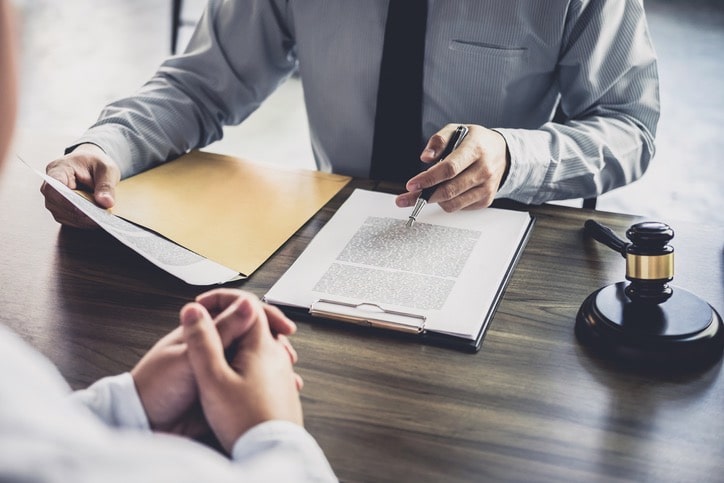How Fault and Liability Is Determined In A Car Accident
There’s a pretty good chance you are going to be involved in a car accident at some point in your life.
Hopefully, it’s nothing major, and it’s something you can walk away from. But, it could also be a severe accident that requires extensive medical attention.
No matter how severe the accident is, someone always has to be assigned fault.
Sometimes it’s obvious who’s at fault, while sometimes it’s not. Like most things in life, gray areas exist when it comes to determining fault in a car accident.
The intricacies of assigning fault are highly subjective. Laws and practices vary by state and by the insurance company, so the specifics of your policy really matter.
In the article below, we will explore how fault is determined in car accidents.
I met with Harry Brown personally and he sat with me for 20 minutes at our initial consultation to explain everything. He even called after my surgery to see how I was doing. I met with him several more times after that and was kept informed about my case throughout. I highly recommend Harry Brown as an attorney.
What Is Fault in a Car Accident?
It seems simple enough, right? Fault is simply who the perpetrator of the accident was.
If you’re rear-ended at a stoplight, it’s easy to determine fault because that accident is much more clear-cut than a situation in which blame could go either way.
After a collision in which multiple drivers are pointing fingers at one another, things can get complicated.
It’s ultimately the job of the insurance company to determine who or what caused the wreck so they can determine who pays.
But it’s still not that simple. Every insurer handles coverage and claims differently, and each U.S. state has its laws about what car insurance must cover and how fault is defined and determined.
It’s never quite as simple as you may think.

No-Fault State vs Fault States
Insurance laws vary state by state. Some states are what is referred to as “no-fault” states, and the rest are “fault” states or tort states.
In no-fault states, each driver turns to their auto insurance for coverage for medical expenses no matter who caused the crash.
In fault states, insurance companies investigate who caused the crash, and car insurance companies pay for damages based on who is found at fault.
Drivers sometimes have to sue the other party for damages in fault states.
Almost every state is a fault state. There are just 12 states that have no-fault coverage, and three of them give their drivers the choice of either fault or no-fault coverage.
In the remaining nine drivers don’t have a choice, and they must carry no-fault coverage.
How the Police Help Determine Fault
After a car accident has been reported to the police, the police will investigate the car accident and then the officers will prepare a police report with the details of the accident.
The officer will interview the drivers and witnesses about the car accident in hopes of piecing together an accurate account of what occurred.
The police report may contain a statement about fault for the accident based on the police officer’s professional judgment.
At the same time, many police reports do NOT include a determination of fault.
Even if a police report states who was responsible for a car accident, this does not automatically mean that the person will be held legally responsible for damages in a subsequent lawsuit.
The police officer might also issue a traffic citation.
While a traffic citation will not ultimately prove who is legally responsible for a car accident, it can be used as evidence that the driver was negligent.

How the Insurance Companies Determine Fault
Once someone has filed a claim with their insurance company after a car accident, the company will assign the claim to an adjuster.
The insurance adjuster handles the investigation into the accident and the settlement of the insurance claim.
It’s not unusual for there to be more than one adjuster involved in the process because each driver’s insurance company will select an adjuster to look into the car accident.
Similar to the police, adjusters research the car accident, speak with witnesses, look at medical reports, examine vehicle damage, and verify details about the insurance policies of the drivers involved like coverage amounts.
The adjusters will determine who was at fault in the car accident, sometimes assigning a percentage of fault to each driver.
Insurance companies determine fault based on the legal definition of negligence in the state where the accident occurred.
Negligence occurs when a person fails to exercise the amount of caution a reasonable person would under the same circumstances.
Related Post: Protect your legal rights after a car accident
What Happens If a Car Accident Case Makes It to Court
Most car accident cases are settled outside of court.
But, if your case makes it to court, a judge or jury will determine who was at fault by considering whether the defendant was negligent.
While deciding your case, the court will examine evidence and consider arguments from the parties’ lawyer.
Either a judge or a jury will determine based on the evidence which driver was negligent and must pay money to compensate for injuries and other losses as a result of the accident.
Police reports and insurance companies do not control the outcome of a court case.
Different rules govern the legal determination of responsibility for a car accident, including precedent from prior cases in the jurisdiction where your case is being heard.
A traffic violation may persuade the court that the party who committed the violation was acting negligently and is therefore at fault for the accident.
This is known as negligence per se and can be very helpful to your case if you were injured by a driver who violated traffic laws.
Hire an Accident Attorney Today
Car accidents are incredibly overwhelming.
Dealing with your injuries, the police, insurance companies, and the possibility of a lawsuit can be very challenging.
Luckily, you don’t have to do it on your own.
If you have been injured in a car accident, a car accident lawyer can help.
They can provide valuable information and legal advice and protect your legal rights and prevent your statements to the police and insurance companies from being used against you.
The Brown Firm Lawyers offer free consultations to those who have been injured as a result of another’s negligence.
Click the button below to receive your free consultation.
Ready to Talk to a Lawyer Who Has Your Back?
Our Recent Personal Injury Articles
Overloaded Truck Accidents in Georgia: Who’s Responsible?
A bus caught fire on Friday night at Ashford Dunwoody Road and I-285 West, causing delays during rush hour. The ramp was closed, and firefighters were able to put out...
The Most Common Causes of Teenage Driver Accidents
A bus caught fire on Friday night at Ashford Dunwoody Road and I-285 West, causing delays during rush hour. The ramp was closed, and firefighters were able to put out...
Postal Worker Dog Attacks: Protecting the Rights of Delivery Personnel
A bus caught fire on Friday night at Ashford Dunwoody Road and I-285 West, causing delays during rush hour. The ramp was closed, and firefighters were able to put out...
The Impact of Texting and Driving Laws on Car Accident Liability in Atlanta
A bus caught fire on Friday night at Ashford Dunwoody Road and I-285 West, causing delays during rush hour. The ramp was closed, and firefighters were able to put out...
Pedestrian Accidents on Crosswalks in Savannah: Proving Driver Negligence
A bus caught fire on Friday night at Ashford Dunwoody Road and I-285 West, causing delays during rush hour. The ramp was closed, and firefighters were able to put out...
Gearing Up for Survival: The Importance of Proper Motorcycle Safety Equipment
A bus caught fire on Friday night at Ashford Dunwoody Road and I-285 West, causing delays during rush hour. The ramp was closed, and firefighters were able to put out...
Why Nursing Home Staff Shortages Leave Residents Vulnerable to Potential Mistreatment
A bus caught fire on Friday night at Ashford Dunwoody Road and I-285 West, causing delays during rush hour. The ramp was closed, and firefighters were able to put out...
When Taxi Drivers Cause Pedestrian Accidents: Legal Options for Injured Parties
A bus caught fire on Friday night at Ashford Dunwoody Road and I-285 West, causing delays during rush hour. The ramp was closed, and firefighters were able to put out...
Bicycle Accident Settlements – What Compensation Can You Expect?
A bus caught fire on Friday night at Ashford Dunwoody Road and I-285 West, causing delays during rush hour. The ramp was closed, and firefighters were able to put out...
Nursing Homes Overprescribing Drugs to Silence and Subdue Patients
A bus caught fire on Friday night at Ashford Dunwoody Road and I-285 West, causing delays during rush hour. The ramp was closed, and firefighters were able to put out...
Contact The Brown Firm
Get the Answers and Compensation You Deserve
You’ll notice the difference when you contact The Brown Firm! Our local dedicated attorneys want to help you recover and rebuild.
Schedule your free consultation by calling (800) 529-1441 or completing our simple online form.

